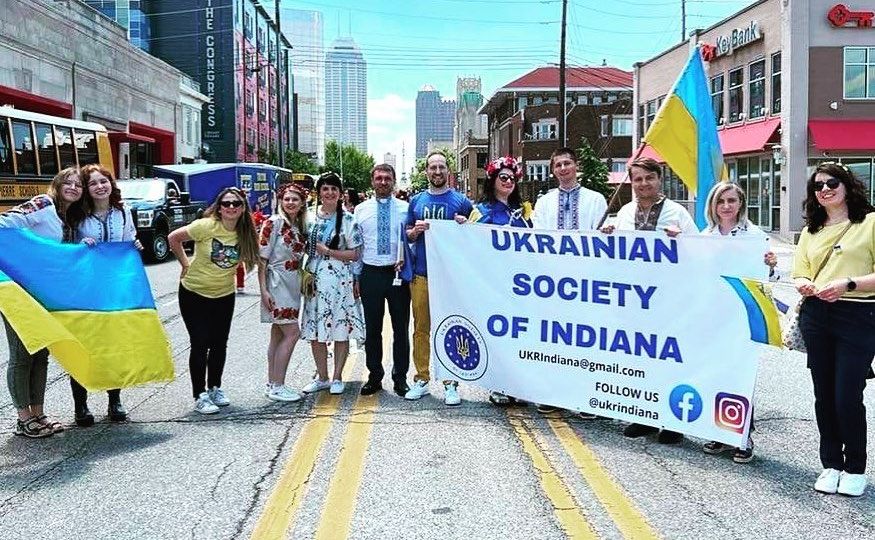

The first flush of dawn crept through Svitlana Ramer’s bedroom window on Tuesday, Feb. 22. It was her first day as the Vice President of Development and External Affairs at The International Center; there was no time for lethargic tendencies to linger, even at 5:45 a.m.
On Wednesday, Feb. 23, Ramer arrived at the center for her second day – welcomed into the office by celebratory cheers and layers of rich meringue. It was her 35th birthday, and given that she was now employed by The International Center, celebrating her Ukrainian roots with a delicious Kyiv cake was only fitting.
Two wonderful days wouldn’t last.
On the morning of Thursday, Feb. 24, Ramer wearily reached for the stop button on her alarm. She pulled her phone off the charger and walked into her bathroom. She saw two missed calls and a message from her mother – strange – because their calls were usually pre-planned.
“WE ARE BEING BOMBED” appeared in a green bubble.
Ramer leaned back against the bathroom wall, not realizing that her body was slowly sliding to the ground as her tears fell with her. Inert, eyes locked on her phone screen, Ramer’s episode of dissociation began.

Within seconds, her haziness turned into an unhinged panic as she struggled to choke down those horrifying words from her mother living in Kyiv. Given their nine-hour time difference, blissful ignorance became a ghost to Ramer at that moment.
“The realization that she had tried to call me, five, six hours earlier, and I hadn’t answered … and now I don’t know if I will ever get to speak to her again …” Ramer said. “Like, did I just miss my last chance to talk to my mother?”
As the day progressed, Ramer’s shockwaves intensified. Somehow, she still got ready, got in her car, and arrived at The International Center. Immobilized by disbelief, Ramer collapsed into her desk chair and stared at the wall.
It wasn’t until her other co-workers started arriving, asking her what the hell she was doing there, that Ramer started to course the reality of the situation. Her entire family was in danger, and she couldn’t do anything about it.
Growing up and going to school in independent Ukraine, the unimaginable truths about Russia that Ramer read about were beginning to manifest off her old textbook pages … again … in the 21st century. But, with all of Ramer’s knowledge came power – and she didn’t stay dormant for long.
Ramer knew she had to act now, and she had to act fast.
***
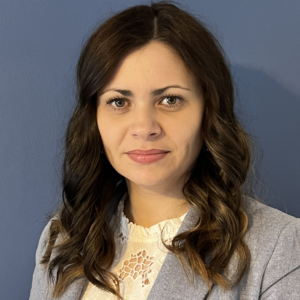
In January, Mariya Plichta left her seven-year banking career to spend more time with her children. She wanted to take a pause at home for a few months, working out life’s kinks.
Plichta’s personal time-out ceased the moment that Russia invaded her home country. With an abundance of family members still living in her hometown of Drohobych, a smaller city on the west side of Ukraine, any thought of a brief hiatus disappeared.
“I could never imagine that my heart would hurt so much for the country where I was born,” Plichta said. “I feel guilt all the time for being safe here.”
The pain cut even deeper when Plichta’s young children noticed her emotional decline, asking why she was so sad all the time. She knew she needed to be strong for them, but with three of her cousins and an uncle on the front lines – shooting at people, seeing friends die – every day tested her.
***
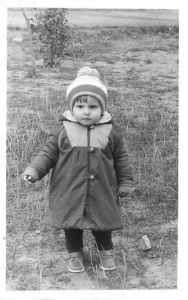
Almost everyone that was important in Ramer’s life existed in the center of chaos when the initial invasion happened. Ramer spent much of her time torn between her own desires and the desires of her mother – who chose to stay in Ukraine despite having a US visa.
Family is a pinnacle value in Ukrainian culture, and Ramer’s mother was not going to leave her own 91-year-old mother behind, especially since she recently suffered a stroke.
“My classmate, she lives in the Netherlands, and she wanted her parents to come stay with her,” Ramer said. “They wouldn’t leave (Ukraine) because they wouldn’t leave their pets behind – they are also family.”
Amidst the craziness, unlike Russian citizens, Ukrainians could speak freely about the war’s happenings. Whether Ramer’s mother updated her on how many times a night she’d been woken up from air raid sirens, or how her 25-year-old coworker had been murdered because his mother was on their city’s council, the terror of it all made Ramer ill.
“I have no idea how my mom was getting through it, because I was not doing well at all,” Ramer said. “Like, talk about coping … I wasn’t.”
***
After a few weeks of coming to terms with Russia’s grim agenda, Plitchta’s sister decided that the two of them needed to take some initiative, so they sought help through Facebook.
Plichta and her sister crafted a post, asking friends and relatives if they could collect anything at all that would help Ukrainians living in the war zone. Medical supplies, pillows, blankets, sleeping bags, clothes – whatever the items were, the donations brought Plichta some solace knowing that she wasn’t just lying in bed and miserable all day.
***
Ramer was seeking to help in any way that she could, too.
Growing up in Fastiv, Ukraine, following the country’s departure from the USSR, Ramer was lucky in the sense that there were no barriers keeping her from investigating the complex narrative that is Russia and Ukraine’s relationship. Ramer learned that Ukraine’s long-held resistance against Russia was not just something that started on Feb. 24; there were 600 years worth of power dynamics in play.
In February of 2014, Ukrainians lobbied at The Revolution of Dignity – following their elected president’s sudden decision to reverse his promise for greater economic integration with the EU, opting to strengthen ties with Russia instead. The protestors understood that their electee was under great duress from Russia, but they defied Ukrainian riot police anyway. The electee ended up fleeing the country, leaving his electors to fend for themselves, while students got shot at and beaten.
To put it lightly, Russia wasn’t pleased with the overwhelming amount of Ukrainians rallying at these large-scale protests. Russia initiated a hybrid war one month later with the annexation of Crimea, then invaded the Donbas region in eastern Ukraine – disguised as separatists.
“The world kind of was like, ‘Oh yeah, they’re going to take a peninsula away from you … that’s fine,’ a little slap on the wrist and we move on with business as usual,” Ramer said. “It is really sad that it has come to this level of atrocity for the world to be like, ‘Oh … we should probably stop Russia.’”
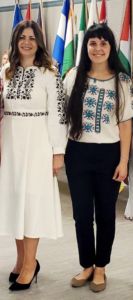
Ramer was taught in school that Latvia and Poland are no strangers to Russia’s animosity and violence, so she contacted the Honorary Consul of Latvia in Indiana, Andris Berzins, seeking someone who truly understood the gravity of Russia’s past and present capabilities.
At such a monumental time in history for Ukraine, there was no coalition or central unifying entity for Ukrainians to turn to in Indiana. Ramer and Plichta had suffered through enough dreadful weeks alone, and coincidentally, they both had the same idea without ever meeting. Plichta sought out help from Berzins, too.
***
With help from the Latvian and Polish communities in Indiana, Ramer and Plichta met for the first time a few days after they spoke separately to Berzins, and together the two women began to curate a cultural non-profit organization of their own, filling the void for Ukrainian Hoosiers: the Ukrainian Society of Indiana.
Very quickly, Ramer and Plichta put together the bylaws of the fledgling organization, and with Plichta’s banking background, she was able to work with the state to get the society established as a legitimate non-profit.

They’ve brought in multiple cultural leaders within the community to comprise the organization’s board of directors. The Director at Mission to Ukraine, Steve Boles, and the Director of the Carmel Redevelopment Commission, Henry Mestetsky, who was born and grew up in Kyiv, are both on the board and rallying behind their mission.
When Plichta moved to America at 17 years old, many people she met didn’t know a lick about Ukraine – some even thought it was in Mexico. Sadly, a catastrophe of this volume had to occur for people around the world to really know where and what Ukraine is. As Plichta and Ramer continue to develop this organization, not only will Ukrainians find comfort in uniting with others that share their lineage, but everyone in the community can learn about Ukrainian traditions and history.
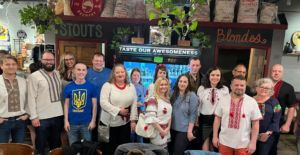
One of the first events they held as an established organization was “The Ukrainian Embroidered Shirt Day Celebration” at a local brewery. To Ramer’s surprise, many more people than she could ever have imagined came out to connect and share in the festivities – including folks who were first, second and third-generation Ukrainians.
The organization has numerous volunteer opportunities as well, ranging from planting trees at Founders Park in Carmel to honor those who have fallen for Ukraine, to cooking, writing encouraging letters to refugees, or simply spreading the word about their mission.
“We’ve heard from people that this is a resource that’s needed for them,” Ramer said. “That gives us a sense of pride that it’s not just something we made up for our own enjoyment.”
***
Since the invasion, Ramer has spoken to Hoosiers at Carmel High School, the Girl Scouts of Central Indiana, and International Women Indiana, along with being a guest on “Hoosier History Live” with Nelson Price – speaking on Ukraine and Russia’s complicated past.
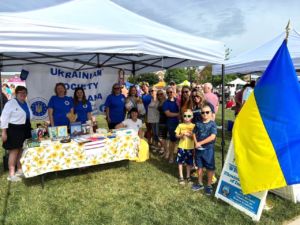
As for Plichta, the war has caused her to reflect back on her time growing up in Drohobych. She recalled a fierce division between Ukrainians: those who spoke Russian and those who spoke Ukrainian. Since the war, Plichta has noticed a shift: Ukrainians who have spoken Russian their entire lives are beginning to speak Ukrainian. She thinks they want to change, too.
While Ukrainian soldiers continue to protect their land and people so valiantly, the fear of something awful happening to a family member is a painful, consistent thought for both Ramer and Plichta. The more that both women can educate others about this war of attrition – even if they have to scream it from the rooftops – the more it will keep their faith from relenting.
“There is still a war,” Plichta said. “Ukrainian people are fighting, and we need to be heard everywhere. Even after the war, we will continue to bring the community together to celebrate Ukraine, together.”
Mina Denny is Indy Maven’s editorial intern. You can connect with her on Twitter and on LinkedIn.
All of our content—including this article—is completely free. However, we’d love it if you would please consider supporting our journalism with an Indy Maven membership.




